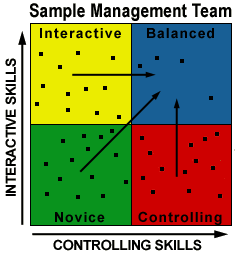Over the past decade, Intel Corp. has been using a multi-rater evaluation tool as part of its management improvement programs.
“It actually helps Intel determine how well its managers perform in their jobs by measuring concrete behaviors,” explains Dan M. Winter, Manager of HR Assessment Services for Intel in Santa Clara, Calif.
While its relationship to management performance measures had been well established through third party research, once Intel began conducting its own validation studies, its perspective and use of the tool began to change.
“It really gave us the data to go back to management to say, This is the right tool for what we need to do. It is not fluff,” Winter says. “so we were able to focus on its broad use instead of defending its applicability.”
The tool, dubbed the Survey of Management Practices by Clark L. Wilson, is a product of The Booth Co., a Boulder-based firm that provides survey feedback tools and reporting services to improve the performance of organizations and the work life of employees.
Winter believes the SMP is a carrot for development, not a stick to punish poor managers. The 100 question survey measures six different phases of the Managerial Task Cycle: Clarifying Goals; Planning and Problem Solving; Facilitating the Work of Others; Obtaining and Providing Feedback; Exercising Positive Control and Reinforcing Group Performance, as well as the impact of these behaviors on morale.
Initially, Intel’s managers used the SMP as part of the first day of a week-long manager development program. About one month before the session, managers received a packet of 10 surveys-one for themselves, one for their supervisor and eight for direct reports. After all surveys were completed, they were mailed directly to Booth. The company ensures their confidentiality and handles all of the data collection, number-crunching and project management. The firm also archives the data for trend analysis and prepares individual manager reports and group seminars.
During workshops, managers received one to two hours of coaching on how to interpret their reports and then they worked individually to review their results. Coaching was available for managers who requested it. For some, however, the information was so surprising that they required more time and support to move their thinking from, “How can people say that about me?” to “I can work on this. I can see how to fix this,” according to Winter.
So Intel and Booth created a separate six-hour course that preceded the week-long workshop. It focuses on interpreting and analyzing survey results so that managers can turn the data into concrete action plans that help them improve and move forward.
Until 1993, several hundred managers each year had completed the survey, which had gathered a lot of attention. “Many new managers said that this was the first time they really heard what good managers did, what skills they needed to work on and how those skills related to each other,” says Winter.
Meanwhile, Booth had shown Intel the results of validation studies from other clients who used the SMP. Realizing that the survey was actually a strategic tool and not just a learning aid, Intel opted to conduct its own validation study with 1,500 managers.
But first the company identified four performance measures that differentiated between excellent and poor managers, such as recent performance review data, promotions and salary increases. Then it used that criteria to select the top and bottom third performers and examined their SMP scores. “We found that almost every score showed a significant difference for high and low performing managers,” recalls Winter. “We were able to say that what we were measuring in the SMP correlated with the results of our annual review process.”
Intel is also in the midst of its second validation study, with Professor Frank Shipper but with 7,000 managers. Winter says it will demonstrate whether the SMP can be universally applied.
Looking back, Winter says Booth has done “a great job” in understanding Intel’s needs and has modified the SMP to meet its local uses around the world. Last year, the firm also placed the questionnaire on the Web as well as its database for client administrators.
“The Booth Co. has allowed us to take the same methods we have used for developing any other skill and to apply that to management in a way that has been very powerful for us,” Winter adds. “Our methods are kept simple, concrete and direct so we can plug the holes in our development activities.”
Human Resource Executive Magazine. September 1998
Reprinted with permission of Human Resource Executive Magazine copyright September 1998. All rights reserved.
